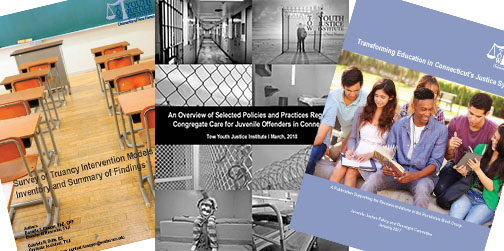
Each year the research team is engaged in a wide variety of activities throughout several project areas. The different topics for the project areas and the relevant accomplishments of the team are discussed below.
Diversion and Education
- A national survey of truancy intervention models was conducted through an online questionnaire to obtain information about how truant children are handled in different states throughout the United States.
- Twelve telephone interviews were conducted to augment the information provided through the online questionnaire. Each interview was transcribed and then themes and recommendations were determined from the transcriptions.
- Using an online questionnaire, feedback was obtained from adults living in the major cities in Connecticut (Hartford, New Haven, Bridgeport, and Waterbury). The information was used to produce an administrative advocacy presentation for local school boards to consider additional feedback as they implement new policies relevant to truant children in the state.
- Each year, the CT State Department of Education produces data on school districts. This data was compiled into a dataset and then reviewed to explore the relationship between truancy and chronic absence among students in Connecticut.
Click HERE to read the National Truancy Inventory Report.
Treatment of Confined Youth in State Run-Facilities
- A study of youth in residential placement (also known as Congregate Care) was completed. Through this project, an inventory was created that outlined the different services available through various providers housing youth throughout the state.
- Youth in state-run facilities are exposed to various disciplinary and behavior management practices. A sample of 30% of videos/discs from 2015-2016 was reviewed and coded for a variety of information about the incident and the outcome of the behavioral or disciplinary response. Analyses were conducted to investigate the difference in treatment received while housed at different state-run facilities.
Click HERE to read the Congregate Care Report.
Community Based Programs and Services for Youth under State Supervision
- Judicially and non-judicially handled youth receive services that respond to their risk and needs. Service and criminal history data was analyzed to determine what youth most commonly receive community-based programs and services and never escalate further into the system.
Study of Multi-Agency Data (2005-2015)
The purpose of this study is to address the legislative mandate pursuant to Public Act 14-217, Section 79, which requires an assessment of state-run facilities that house children and youths involved in the juvenile justice system. This included Court Support Services Division Detention Centers in Bridgeport, Hartford, and New Haven, Department of Children and Families Connecticut Juvenile Training School and Pueblo Unit, and the Department of Correction Manson Youth Institute and York Correctional Institution.
Click here to view an infographic of findings.
Click here to review the recommendations and findings from the Multi-Agency Data study of the Detention Centers presented to the JJPOC on June 21, 2018.
Click here to review the recommendations and findings from the Multi-Agency Data study of the Manson Youth Institute and York Correctional Institution presented to the JJPOC on July 19, 2018.
There were three studies completed in 2019:
The Pre- and Post-Assessment of Community-Based Programs and Recidivism Outcomes
This study contrasts changes in community-based programs, the demographic characteristics of youths served, and recidivism outcomes leading up to and throughout the implementation of Connecticut’s Public Act 07-04, known as the Raise the Age (RtA) legislation. This study also addresses the legislative mandate stated in Public Act 14-217, which calls for an assessment of community-based programs, and focuses on the different programs used to address youth’s needs through services.
Video Review of Use of Restraint in State-run Facilities
Video Review of Use of Restraint in State-run Facilities evaluates if videos of incidents and incident reports, where seclusion or restraint was used, from January 1st, 2015 to December 31st, 2016 were in violation of disciplinary practices. As part of the JJPOC legislations, this project augments Congregate Care Phase I. Using data that has been collected from state agencies; sample videos were reviewed for a content analysis was conducted to assess differences in practices and documentation throughout the state of Connecticut.
Interviews with Youth Detained or Committed in State-run Facilities
This involved conducting interviews with youth who have been housed at a juvenile detention center or have been housed at an adult facility in Connecticut. These interviews focus on open-ended questions that highlight youths understanding of the rules, the supervision of the facility, the perception of
There are three studies in progress:
Achieving Positive Youth Outcomes Creating Safer Health Communities
This research study will provide valuable data for the RED and Diversion/ JRB’s work previously included in P.A.-15-183. It will assess the current state of diversion and early intervention in the state of Connecticut, with emphasis of racial and ethnic diversity. This project will help inform policies and practices being implemented through the Community-Based Diversion Systems Plan, as well as other initiatives of the Juvenile Justice and Policy Oversight Committee (JJPOC).
Health, Housing, & Education Indicators for DCF/Justice-Involved Youths and Young Adults
This mixed method examination will assess health, housing, and education indicators that inform system contact for DCF/justice-involved youth and young adults’. This project will involve coordination and collaboration among multiple system stakeholders to identify points to leverage to maximum effect prevention and intervention efforts in the state.
Mental Health and Trauma among Juveniles on Probation Residing in the Community
This will assess the mental health and trauma by engaging with Connecticut’s youth who are residing in the community under the supervision of Court Support Services Division (CSSD). This project will incorporate measures of trauma, moral disengagement, and experience with diversion while longitudinally following up with data on justice-involvement and incarceration among the youth.